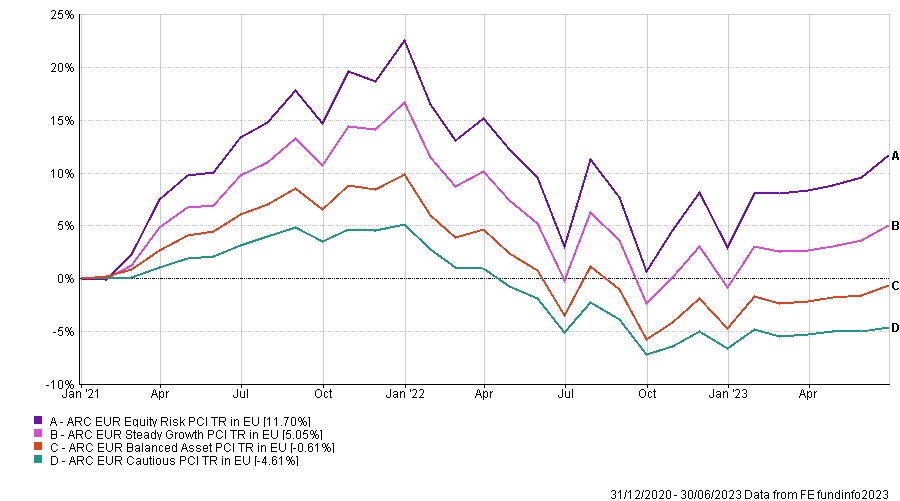This update is a look back at 2022 and the year so far in 2023! I believe that 2022 was one of the toughest years of the 25 of my career in terms of the very difficult conversations I had with many of my clients. Those 25 years included the DotCom Bubble, 9:11, the invasion of Afghanistan, the second Iraq war and the Global Financial Crisis.
Finance update Q2 2023
By Peter Brooke
This article is published on: 4th August 2023
2022 was different for one main reason… it seriously affected Cautious and Balanced investors and as most of my clients are retired and therefore dependent on their capital for income, it means they need to take a more cautious or balanced approach to managing their money.
So what happened?
At the start of 2022 markets were pricing in a low to moderate increase in interest rates for the whole year, how wrong they were … in fact, the US Federal Reserve raised rates by 4% in 2022 and have carried on into 2023 and many other central banks followed suit.
When interest rates rise, the values of government and corporate bonds fall but long-standing portfolio theory states that bonds must always make up a large part of cautious portfolios, hence the very difficult year for cautious investors. Equities (shares) didn’t fare much better but have shown a faster recovery towards the end of 2022 and into 2023.
This chart shows four different typical risk profiles over the last 2 ½ years taking in the recovery from Covid to the inflation spike, invasion of Ukraine and the year so far. Highlighting the tough times that cautious (green line) and balanced (orange line) investors have had over the past few years.
So why did this happen?
Inflationary pressures had started to build up as economies reopened after the Covid pandemic. Supply chain disruption during the pandemic created shortages, which collided with a sudden increase in demand. An under-investment in energy, particularly fossil fuels also contributed to inflation through higher oil and gas prices.
The war in Ukraine shifted this inflation problem to a full-blown cost-of-living crisis. Central banks were slow to act initially, thinking it was all linked to the pandemic, but it soon became clear that rising prices would be more persistent than expected. Central banks had no alternative but to raise interest rates.

Financial Markets in 2022
Equities
2022 was a year most investors would rather forget, with bond and equity markets seeing significant falls and uncomfortable volatility. Importantly, holding a portfolio of bonds and equities provided little protection, as both asset classes proved correlated to high inflation.
The year also saw a considerable rotation from “growth” to “value”, ending the long dominance by the technology sector. In particular, many of the stock market darlings of the previous decade saw weakness – Meta Platforms, Amazon, Alphabet and Netflix. At the same time, investors had assumed the strong performance of areas such as e-commerce during the pandemic would persist in a normal environment. It didn’t, earnings fell and share prices were hit hard.
Energy was the only obvious victor at a time when commodity prices were high, though share price rises slowed in the second half of the year as governments demanded a share of their windfall profits. Nevertheless, the sector remained the best performing of 2022.
The UK stock market outpaced most of its international peers due to a bias in the year’s most popular sectors such as mining, commodities, oil and gas, and the shift away from growth sectors such as technology, which are only lightly represented in UK equity markets.
Bonds
It was a grim year for bond markets, which had to contend with rising inflation and interest rates. Where the US led, other bond markets followed. The UK has its own idiosyncratic problems, when an ill-judged ‘mini-budget’ under new Prime Minister Liz Truss in September 2022 crashed the pound and caused a spike in UK borrowing costs.
As discussed above, rising yields meant significant losses for investors. Most bond investors saw double-digit falls in their bond investments over the year. It may be little reassurance, but bond prices have recovered from those lows and yields are now at more reasonable levels reflecting the interest rate environment more accurately. They may once again be able to fulfil their traditional role in portfolios – as a source of income and a diversifier from equities.

Financial Markets so far in 2023
So, with this backdrop and a difficult year behind us how have things fared so far in 2023?
Firstly, the gloomy scenario envisaged by many economists at the start of the year has not come to pass. The much-anticipated US recession has been deferred, while financial markets have remained resilient.
The IMF is now predicting a rise in global growth for 2023 though much of this growth won’t becoming from developed economies while emerging markets economies are expected to expand led by China and India.
Inflation has come down but has proved far stickier than many expected, with labour markets remaining healthy across most major economies. This has forced central bankers to continue raising interest rates. While the US Federal Reserve appears to have paused with central bank rates of 5.25%, the UK and eurozone central banks are still raising rates and have indicated further rises may lie ahead.
Financial markets have been resilient. The disruption created by the collapse of several banks proved short-lived, with swift action from policymakers and regulators preventing wider problems.
The US stock market has seen a surprising surge from the technology sector. After a grim year in 2022, against expectations, they roared back in 2023. The galvanising force has been generative artificial intelligence, with excitement around Chat GPT creating interest in semiconductor companies such as Nvidia as businesses look to invest in this new technology.
The US economy continues to deliver mixed messages. A buoyant labour market has continued to reduce expectations of a deep recession.The Fed has remained resolute on interest rates, although it paused rate rises in June, it has made it clear that it is willing to raise them again should inflation continue to rise.
Recession appeared an inevitability for the UK economy at the start of the year. As it is, it has not materialised, with falling energy prices, government support and a resilient consumer all acting to shore up growth. Inflation has remained stubbornly high and so the Bank of England has been forced to keep raising interest rates, which are now expected to peak at around 6%.
The UK stock market had a weak start to the year as commodity prices fell and the banking sector was hit by the failures of Credit Suisse in Europe and Silicon Valley Bank in the US. The resurgence of US technology stocks also impacted the UK market as investors swapped from “value” back to “growth” companies.
It was a stronger period for stock markets in Europe as company earnings improved and outstripped the US early in the year. A mild winter and prompt action by governments across the region saw an energy crisis averted. The region was also lifted by the resurgence of China, which is an important export market, particularly for Germany and Spain.
The European Central Bank raised interest rates to 3.5% in June, their highest level in 22 years. Eurozone Consumer price inflation declined steadily from over 10% in October 2022.
The outlook for Asia has been dominated by China. The country’s reopening in October 2022 led hopes of galvanising global economic growth at the start of the year. However, the initial stock market rally petered out as growth has not bounced as many had hoped. Confidence has not yet returned to pre-pandemic levels.
Asian markets have continued to lag their global counterparts as expectations of a swift return to economic growth in China have receded. Nevertheless, there remain plenty of reasons to be optimistic as Chinese stimulus for infrastructure projects is beginning to feed through to the economy.
Japan has been rediscovered by investors in 2023, with veteran investor Warren Buffet making a high-profile investment in the country’s stock markets. The Japanese economy is also starting to improve as reopening gathers pace and wage growth drives consumer spending. As a net importer, it is also benefiting from lower oil prices, which is helping to improve the Government’s fiscal position.
Bonds
The yield (interest paid) on US ten-year government bonds dipped in April, but moved back up as investors started to anticipate more rate rises ahead. Short-dated bonds now have higher yields than longer-dated bonds. This situation is known as an inverted yield curve and means investors expect rates to be cut over the longer term.
This “inversion” is currently common place, with 37 countries now trading with inverted yield curves, including the UK,Germany, France and Canada.

Conclusion
Financial markets seem to be in a holding pattern, waiting to see how much impact higher interest rates will have on economic activity and looking for clear signs that the interest rate cycle has peaked, and the next rate move is downwards. From the strength of China’s recovery to a potential recession in the US to the resilience of the corporate sector, there are major questions going into the second half of this year.
I am, once again, very grateful to the team at Evelyn Partners for their help in putting this summary together and hope it is useful in framing where we are today and how we got here.
They have some excellent articles on the impact of AI and the basics of how Bonds work.
https://www.evelyn.com/insights-and-events/insights/the-basics-of-bonds



